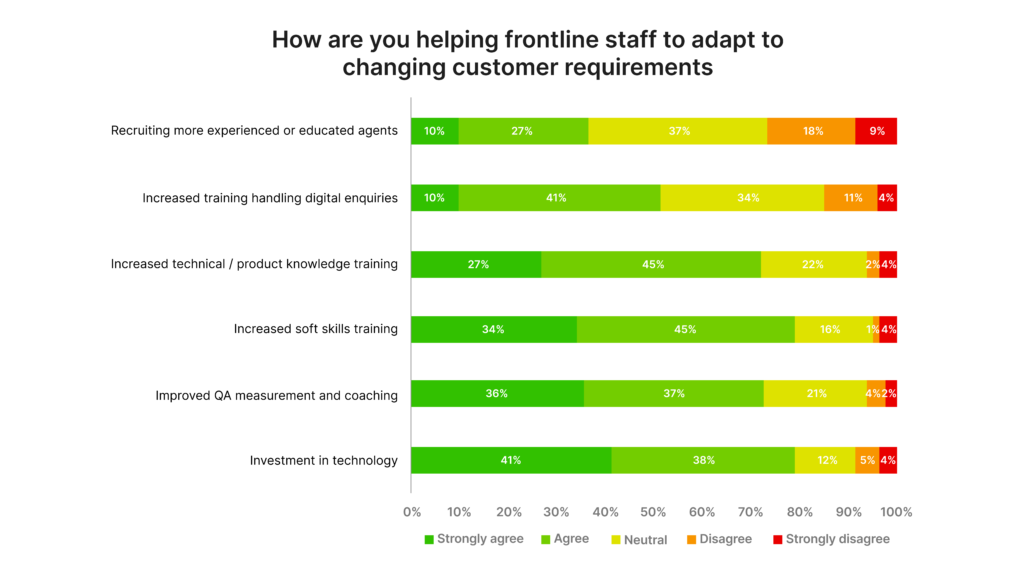Keeping Agents Updated and Engaged

In an era of rapidly advancing technology, the emergence of new job roles and tools is evident, aimed at streamlining operations and enhancing efficiency within contact centers. Consequently, upskilling is gaining paramount importance. Maintaining a workforce of agents who are not only up-to-date but also adaptable to industry advancements is crucial for the sustained success of your contact center.
This business trend revolves around facilitating continuous learning among teams. It entails the implementation of training programs and development opportunities designed to broaden skill sets and mitigate potential disparities among employees.
This well-established strategy in the corporate world, when applied within the realm of customer service, becomes indispensable. It serves as a linchpin for generating added value, elevating agent satisfaction, and ultimately, achieving superior performance in your contact center.
Recent research, including reports like ManpowerGroup’s “Humans Wanted: Robots Need You” emphasizes the changing landscape of skills in the workforce. It highlights that while there’s a growing demand for technical and digital skills in various job functions, employers are placing increasing importance on human skills. The “Humans Wanted: Robots Need You” report indicates that 43% of organizations find it more challenging to teach soft skills like analytical thinking and communication than in-demand technical skills.
This report predicts that by 2030, there will be a 26% increase in demand for human skills, particularly social and emotional soft skills, across all industries in the United States. These skills include problem-solving, communication, relationship-building, and managing machines.
Additionally, the World Economic Forum’s “Future of Jobs Report” points out that by 2022, a significant 54% of all employees will require significant re- and upskilling. This report highlights that skills continuing to grow in prominence by 2022 include analytical thinking, innovation, active learning, and learning strategies.
Benefits of implementing Upskilling
- Enhancing Employee Experience: Implementing upskilling in your Contact Center boosts employee engagement, productivity, and loyalty. It provides opportunities for skill development and ensures your team is equipped with the latest technological knowledge, resulting in improved customer satisfaction.
- Reducing Costs and ROI: Upskilling your existing workforce is a cost-effective alternative to frequent recruitment. It builds a loyal, skilled team capable of meeting market demands, yielding a higher return on investment over time.
- Increasing Productivity and Agility: Upskilling improves employee performance without adding stress. It enhances productivity and prepares your team for industry changes, ensuring operational efficiency.
- Simplifying Recruitment: Investing in employees makes your organization attractive to top talent. Positive feedback from agents creates a strong customer service team and a positive image, attracting new talent and strengthening your brand.
Develop an upskilling plan
Understanding the advantages of fostering a skills enhancement culture within an organization is the initial phase. Yet, the real challenge lies in identifying which individuals require skill upgrades and pinpointing the optimal timing for these enhancements to ensure the strategy’s effectiveness.
- Evaluate Skills for Identifying Knowledge Gaps
The first step in any strategic initiative is to assess the current situation, gain an understanding of your starting point, and define your objectives. It’s crucial to familiarize yourself with your existing workforce and their capabilities. This information allows you to pinpoint potential knowledge gaps among your team and uncover latent skills you might not have been aware of. Additionally, keeping an eye on the operations of key competitors in your sector can help gauge your company’s standing.
- Establish Clear Objectives
Once you’ve identified your team’s strengths and weaknesses, along with market developments in the contact center industry, it’s time to set your upskilling objectives. Maintain a balance between immediate needs and long-term goals when determining these objectives.
- Focus on Suitable Candidates
Upskilling in a Contact Center can be broad and apply to specific skills, or it can be tailored to individuals. You may also choose a combination of both approaches, involving as many employees as necessary.
- Develop Upskilling Strategy
To create an effective action plan, rely on the skills and weaknesses you previously identified as a guide. Keep in mind that people have diverse learning preferences, so it’s advisable to employ various tools adapted to individual learning styles. Here are some examples:
- Learning and Development Programs: These encompass courses, conferences, seminars, or workshops, both online and offline, designed to expand your staff’s knowledge.
- On-the-Job Training: For a more hands-on approach, consider placing employees in their work environment alongside experienced professionals in a specific role. This allows them to perform new tasks under close supervision and acquire the skills needed for independent application.
- Mentoring: Tutorials are particularly useful for transferring implicit institutional knowledge. Junior employees, for instance, can learn from senior colleagues through direct interaction and guidance, developing new skills and expanding their capabilities.
- Job Rotation: Encouraging staff rotation within the organization enables employees to assume new roles, helping identify positions that align with their existing skills.
- Measure the Outcomes of Upskilling and Iterate: Upskilling is not a one-size-fits-all process. To achieve satisfactory results, adopt a proactive approach and develop flexible procedures tailored to each situation. Record each step of the process, assess the results achieved, and determine which strategies align best with your company and team. Continual refinement is key to upskilling success.

